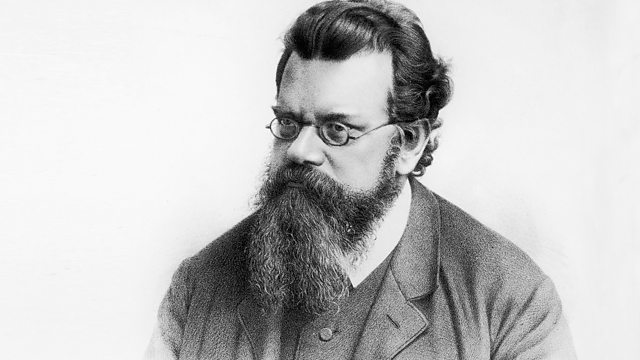Kinetic Theory
Melvyn Bragg and guests discuss the growth of ideas about gas pressure, from Newton's theory that static particles push against each other to Maxwell and Boltzmann's moving atoms.
Melvyn Bragg and guests discuss how scientists sought to understand the properties of gases and the relationship between pressure and volume, and what that search unlocked. Newton theorised that there were static particles in gases that pushed against each other all the harder when volume decreased, hence the increase in pressure. Those who argued that molecules moved, and hit each other, were discredited until James Maxwell and Ludwig Boltzmann used statistics to support this kinetic theory. Ideas about atoms developed in tandem with this, and it came as a surprise to scientists in C20th that the molecules underpinning the theory actually existed and were not simply thought experiments.
The image above is of Ludwig Boltzmann from a lithograph by Rudolf Fenzl, 1898
With
Steven Bramwell
Professor of Physics at University College London
Isobel Falconer
Reader in History of Mathematics at the University of St Andrews
and
Ted Forgan
Emeritus Professor of Physics at the University of Birmingham
Producer: Simon Tillotson
Last on
More episodes
Previous
LINKS AND FURTHER READING
听
READING LIST:
Stephen G. Brush, The Kinetic Theory of Gases: An Anthology of Classic Papers with Historical Commentary (Imperial College Press, 2003)
Brian Clegg, Professor Maxwell鈥檚 Duplicitous Demon (Icon Books, 2019)
Carlo Cercignani, Ludwig Boltzmann: The Man Who Trusted Atoms (Oxford University Press, 2006)
Olivier Darrigol, Atoms, Mechanics, and Probability: Ludwig Boltzmann鈥檚 Statistico-Mechanical Writings - An Exegesis (Oxford University Press, 2018)
Richard Feynman, Robert Leighton and Matthew Sands, The Feynman lectures on Physics: Vol I (Basic Books, 2011), especially chapters 39-43
Raymond Flood, Mark McCartney, and Andrew Whitaker (eds.), James Clerk Maxwell: Perspectives on His Life and Work (Oxford University Press, 2014)
Gerald Holton and Stephen G. Brush, Physics, the Human Adventure: From Copernicus to Einstein and Beyond (Rutgers University Press, 2001)
Oded Kafri and 岣峁縜 Kafri, Entropy: God鈥檚 Dice Game (CreateSpace, 2013)
Keith J. Ladler, The World of Physical Chemistry (Oxford University Press, 1995)
David Lindley, Boltzmann鈥檚 Atom: The Great Debate That Launched A Revolution in Physics (Free Press, 2016)
Basil Mahon, The Man Who Changed Everything: The Life of James Clerk Maxwell (John Wiley & Sons, 2004)
Abraham Pais, Subtle is the Lord: The Science and Life of Albert Einstein (Oxford University Press, 2005)
Theodore M. Porter, The Rise of Statistical Thinking, 1820-1900 (Princeton University Press, 1986)
听
Broadcasts
- Thu 23 May 2019 09:00麻豆官网首页入口 Radio 4
- Thu 23 May 2019 21:30麻豆官网首页入口 Radio 4
Featured in...
![]()
19th Century—In Our Time
Browse the 19th Century era within the In Our Time archive.
![]()
Science—In Our Time
Scientific principles, theory, and the role of key figures in the advancement of science.
In Our Time podcasts
Download programmes from the huge In Our Time archive.
The In Our Time Listeners' Top 10
If you鈥檙e new to In Our Time, this is a good place to start.
Arts and Ideas podcast
Download the best of Radio 3's Free Thinking programme.
Podcast
-
![]()
In Our Time
Melvyn Bragg and guests discuss the ideas, people and events that have shaped our world.



